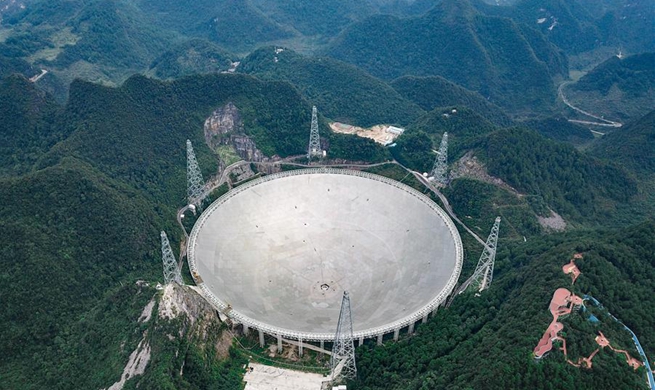by Matthew Rusling
WASHINGTON, Dec. 21 (Xinhua) -- The U.S. government is due to shut down at midnight on Friday, as lawmakers have been unable to hammer out a deal with U.S. President Donald Trump over funding for a border wall. The path forward seems uncertain, as both sides are digging in their heels.
Since his campaign for presidency, Trump has promised to build a wall along the massive U.S.-Mexico border, at a time when droves of illegal migrants are crossing into the United States from Mexico each year. While many are economic migrants from various Latin American countries who are seeking a better life, Trump has argued that drug smugglers and violent gangs are among those entering the U.S. illegally.
The current government spending bill, which funds the federal government, is due to expire at midnight Friday. Trump has vowed to veto any spending bill that does not contain funding for the wall. With lawmakers unable to cut a deal on border wall funding, a government shutdown seemed certain on Friday evening, just hours before midnight.
Congress is set to meet again at noon on Saturday, after the shutdown has already kicked in, but it remains unknown whether Congress can reach a deal with the White House. Trump and the GOP argue that the wall is for the purpose of border security, but Democrats are strongly against it.
Indeed, the stakes are high for Trump, as building a wall is a key campaign promise, and he needs to keep the approval of his base.
"President Trump feels his personal credibility depends on keeping his promise to build a border wall. That was the centerpiece of his domestic agenda and something he emphasized all around the country. Failing to deliver on that, even in a token manner, would alienate his political base," Brookings Institution Senior Fellow Darrell West told Xinhua.
"Yet shutting down the government is likely to be politically toxic," West said.
Democrats are also digging their heels in, saying Trump's demands will not be met.
In a speech on Friday addressed to Trump, Democratic leader Sen. Chuck Schumer said, "You are not getting the wall today, next week or on January 3rd when the Democrats take control of the House."
For his part, Trump on Friday reiterated that the government would see a lengthy shutdown if his demands for wall funding are not met. "I hope we don't, but we are totally prepared for a very long shutdown. This is our only chance that we will ever have, in our opinion," to get funding for a border wall, he said.
HISTORY OF U.S. GOV'T SHUTDOWNS
Threats of government shutdowns are nothing new in U.S. politics. This would be the third shutdown in a year, after two short-lived shutdowns last January.
Such standoffs also occurred a number of times under the previous administration, which was marked by deep partisan rivalry in Washington, just like the current administration.
Shutdowns occur when Congressional spending bills reach their expiration date, and lawmakers and the president cannot agree on the terms or amount of a new one. There have been nearly two dozen shutdowns since 1976, and shutdowns are constitutional.
The term "shutdown," which is often misunderstood, means that a number of departments will not receive funding until a deal is made. Usually staff there will work for a time without pay and the office won't completely close. Failure to make a deal means departments including the Treasury, Homeland Security and Justice will have hundreds of thousands of employees that will have to work without being paid until a deal is cut.
BORDER WALL PROMISES
Many of Trump's core supporters are working-class males who believe -- rightly or wrongly -- that illegal immigration has impacted them negatively, such as creating unfair competition for jobs and lowering wages. Trump, as part of his push to bring back manufacturing and terminate illegal immigration, has promised to build a wall and have Mexico, just across the southern border, pay for it.
"There is a long-standing, even historical, anxiety about low-wage competition. The 'left' solution to this issue would be unions; the 'right' solution to it is to demonize an 'other' or out-group," Clay Ramsay, a researcher at the University of Maryland, told Xinhua.
"Attitudes toward economic immigration into the U.S. and attitudes toward competition from other countries are related," he said.
Democrats are staunchly against the idea of a wall, and are unlikely to approve any funding for the project, which will come at a multibillion U.S. dollar price tag.
Ramsay said approximately a third of Americans believe in the wall idea, noting recent polls.
Recent polls find that a slight majority of registered voters believe the president should compromise on the wall idea. At the same time, a majority of Democratic voters say he should compromise, and a majority of GOP voters say he should not compromise.
Christopher Galdieri, assistant professor at Saint Anselm College, told Xinhua that Trump's strongest supporters latched onto his candidacy over the issue of immigration.
"By making a wall his number-one policy priority, Trump was staking out the maximal possible position on immigration, and one that no other GOP candidate could compete with," Galdieri said.
"By and large, opponents of immigration are people who worry about their ethnic group being displaced or outnumbered in the future, and that their children's futures will somehow be affected negatively as a result," he said.













